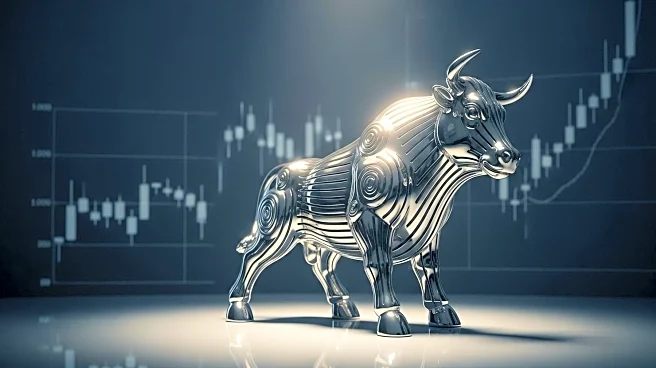What's Happening?
Retail investors have returned to the U.S. stock market in significant numbers following a quiet summer period. According to JPMorgan, these investors have poured approximately $7 billion into stock purchases over the past week, marking a substantial increase from the $5.3 billion weekly average observed in the previous two months. This resurgence is attributed to recent stock records and rallies in gold and bitcoin, which have boosted optimism among everyday traders. Notable investments include over $50 million in Occidental Petroleum shares and significant purchases in Quantum Computing and Verizon stocks. Conversely, retail investors have sold off more than $330 million in AMD shares following the company's deal with OpenAI.
Why It's Important?
The return of retail investors to the stock market is significant as it indicates renewed confidence in the market's potential for growth. This influx of capital can drive stock prices higher, benefiting companies and potentially leading to increased market volatility. The focus on specific stocks, such as Occidental Petroleum and AMD, highlights the influence of retail investors on market dynamics. Their actions can impact stock valuations and corporate strategies, especially in sectors like technology and energy. The revival of interest in meme stocks, as evidenced by the resurrection of Roundhill Investments' Meme Stock ETF, suggests a potential shift in investment trends.
What's Next?
As retail investors continue to influence the stock market, companies may adjust their strategies to cater to this demographic. The increased activity could lead to further stock price fluctuations, prompting institutional investors to reassess their positions. Additionally, the focus on meme stocks and high-risk investments may attract regulatory scrutiny, potentially leading to new guidelines or restrictions. The market's response to these developments will be closely monitored by analysts and investors alike.
Beyond the Headlines
The resurgence of retail investors raises questions about the sustainability of their influence on the stock market. While their actions can drive short-term gains, the long-term impact on market stability remains uncertain. The focus on high-risk investments, such as meme stocks, may lead to increased volatility and potential losses for inexperienced traders. This trend underscores the need for financial education and awareness among retail investors to mitigate risks and make informed decisions.











